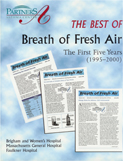Breath of Fresh Air: Feature Articles
Chapter 21: Asthma and Heartburn: What's the Connection?
Among the many small miracles of normal bodily function that we often take for granted is the fact that food, once swallowed, makes its way down into the stomach. And once there, it stays there (to be digested) rather than regurgitates back up the swallowing tube (esophagus). In part, gravity helps to keep the food down, at least when we are seated or standing. In part, a muscle at the far end of the esophagus, just before the entrance to the stomach, helps to regulate the flow of food, relaxing (dilating the swallowing tube) to let food enter the stomach and contracting (narrowing the swallowing tube) to prevent return of food up from the stomach. |
Sometimes stomach acid escapes up from the stomach into the swallowing tube (esophagus). |
|
|
Sometimes the system fails, and the contents of the stomach can flow back up the esophagus. The culprit is usually the muscle that encircles the bottom of the swallowing tube, called the "lower esophageal sphincter." When this muscle does not contract with sufficient force, the stomach and esophagus act as though they were one container -- like a sack with a long neck. If one applies pressure to the bottom of the sack, liquid flows up the long neck to the opening at its top. By analogy, if one bends over and thereby increases pressure on the stomach, acid and digestive proteins in the stomach will flow up the esophagus toward the mouth. Similarly, when one lies down, gravity no long protects against the reflux of stomach contents. Without the protection of the lower esophageal sphincter, stomach contents can regurgitate back up when one lies flat. |
When this occurs repeatedly, it is called “gastroesophageal reflux disease” or GERD. |
|
|
The sensation of a vertically-oriented burning behind the breast bone (sternum), a sour taste and burning in the back of the throat, hoarse voice, and a cough may all be signs of stomach acid regurgitating up the esophagus to the back of the throat. Gastroesophageal reflux disease, abbreviated GERD, is the medical name for this condition. What does GERD have to do with asthma? Many physicians believe that there is an important connection, that GERD may worsen asthma and be a common cause of difficult-to-control asthma. Imagine the following in a person with asthma and GERD. It's late at night, you've just eaten a large meal, and soon thereafter you ly down and go to sleep. While you are sound asleep, stomach contents roll up the esophagus and into the back of your throat. Before you awaken with any discomfort, you take your next breath in and inhale the liquid material onto your bronchial tubes. You aspirate stomach acid into your airways. Perhaps you wake up coughing, perhaps not. But undoubtedly hydrochloric acid inhaled onto your bronchial tubes will cause more inflammation and worsen the symptoms of asthma. |
GERD can make asthma worse if the acid is inhaled onto the breathing tubes, and maybe even by nerve reflexes connecting the swallowing and breathing tubes. |
|
|
Some physicians believe that stomach acid need not be breathed into the lungs to cause problems in persons with asthma. They argue that just the presence of acid flowing up into the esophagus — where it does not belong — can trigger a reflex via nerves in the chest that leads to narrowing of the bronchial tubes. Some studies support the concept that acid applied onto the esophagus cause bronchospasm in persons with asthma, other studies have not. Finally, it is easy to see that acid reflux might cause chest discomfort and coughing that might be mistaken for symptoms of asthma. Persons with asthma will feel worse in their chest if they have GERD, and treating the GERD will alleviate some of their chest symptoms, even if it does not directly affect their asthma. |
You can treat GERD by
modifying your diet and eating habits,… |
|
A number of effective therapies are available to treat GERD. Avoiding large meals before lying down at night will help, as will avoiding carbonated beverages, which distend the stomach. Certain foods and medications may interfere with functioning of the lower esophageal sphincter, causing it to relax too much. If you have GERD, you should avoid caffeine and chocolate and, if possible, the asthma medication, theophylline. |
…by elevating the head of your bed,… | |
|
Another useful measure to reduce acid reflux is elevation of the head of the bed by approximately 4-6 inches (for instance, bricks or cinder blocks placed under the frame of the bed at its head). By sleeping on a slight incline, gravity continues to assist in reducing acid regurgitation up toward the mouth. (Raising one's head on two or three pillows will not have the same effect; the entire torso needs to be on a slant.) The medications most commonly used to treat GERD are those that reduce production of stomach acid. Over-the-counter medications such as Tagamet®, Pepcid®, Axid®, and Zantac® are safe and effective. Even more powerful are precription medications such as Prilosec® and Prevacid® [and Aciphex® and Protonix®] that virtually completely stop stomach acid from being produced. Finally, other medications, such as Reglan®, speed emptying of the stomach, leaving less liquid in the stomach available for reflux. Without doubt, if you have asthma and GERD, treating GERD will make you feel better and will protect your lungs from possible harm. Sometimes it will also make your asthma better. |
…and by taking
medications that turn off stomach acid production. |

